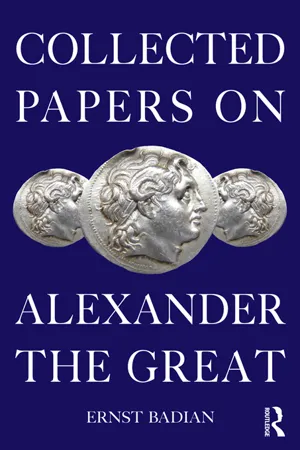
Collected Papers on Alexander the Great
Ernst Badian
- 540 Seiten
- English
- ePUB (handyfreundlich)
- Über iOS und Android verfügbar
Collected Papers on Alexander the Great
Ernst Badian
Über dieses Buch
Professor Ernst Badian (1925-2011) was one of the most influential Alexander historians of the twentieth century. His first articles on the subject appeared in 1958, and he continued for a full fifty years to reshape scholarly perception of the reign of Alexander the Great. A steady output of articles was reinforced by lectures and reviews in his own formidable style. Badian's earliest work transformed understanding of aspects of the Roman Republic, and he continued to work on that area throughout his career; but his series of studies of Alexander the Great (which he deliberately never summed up in a synoptic work) demolished the hero of his predecessors such as Droysen and Tarn, whom he regarded as starry-eyed hero-worshippers, and created an Alexander on the model of a twentieth-century tyrant. The Alexander who was a ruthless killer of his rivals and those who disagreed with him, a mass-murderer in his conquests, and perhaps even an incompetent imperialist, has superseded the Alexander whose mission it was to bring Greek civilization to the ends of the earth. These essays and articles provide a new layer in the interpretation of a figure who has not ceased to fascinate since his death in 323 BC.
Many of these articles were published in out-of-the-way journals and conference volumes, and are brought together here for the first time in a collection which will provide student and scholar with a view of the full range of Badian's work on Alexander. Certain ephemeral pieces and all reviews except one have been excluded, by the wish of the author. The twenty-seven articles included were all revised by the author before his death, but there has been no other editorial intervention. The volume also includes a portrait, and an introduction by Eugene Borza surveying Badian's career and contribution. No one who works on Alexander the Great can afford to be without this book.
Häufig gestellte Fragen
Information



Inhaltsverzeichnis
- Cover
- Half Title
- Title Page
- Copyright
- Dedication
- Contents
- List of illustrations
- Foreword
- Introduction
- 1. ‘Alexander the Great and the Unity of Mankind’. Historia 7 (1958), 287–306
- 2. ‘The Eunuch Bagoas’. Classical Quarterly n.s. 8 (1958), 144–52
- 3. ‘The Death of Parmenio’. Transactions and Proceedings of the American Philological Association 91 (1960), 324–338
- 4. Review of L. Pearson, The Lost Histories of Alexander the Great. Gnomon 33 (1961), 660–67
- 5. ‘Harpalus’. Journal of Hellenic Studies 81 (1961), 16–43
- 6. ‘Alexander the Great and the Loneliness of Power’.Australasian Universities Modern Languages Association (1962), 80–91
- 7. ‘The Death of Philip II’. Phoenix 17 (1963), 244–250
- 8. ‘The Date of Clitarchus’. Proceedings of the African Classical Association 8 (1965), 5–11
- 9. ‘Orientals in Alexander’s Army’. Journal of Hellenic Studies 85(1965), 160-161
- 10. ‘Alexander the Great and the Greeks of Asia’. Studies in Honour of V. Ehrenberg (Blackwell 1966), 37–69
- 11. ‘Agis III’. Hermes 95 (1967), 170–192
- 12. ‘A King’s Notebooks’. Harvard Studies in Classical Philology 72 (1968), 183–204
- 13. ‘Nearchus the Cretan’. Yale Classical Studies 24 (1975),147–170
- 14. Review of K. Kraft, Der ‘rationale’ Alexander. Gnomon 47 (1975), 48–58
- 15. ‘The Battle of the Granicus’. Ancient Macedonia 2 (1977), 271–293
- 16. ‘The Deification of Alexander the Great’. Studies in Honour of Charles Edson, Institute of Balkan Studies (1981), 27–71
- 17. ‘Greeks and Macedonians’. Studies in the History of Art 10 (Symposium series 1) (1982), 33–51
- 18. ‘Alexander at Peucelaotis’. Classical Quarterly 37 (1987), 117–128
- 19. ‘The Ring and the Book’. Festschrift G. Wirth, ed. W. Will (1988), 605–625
- 20. ‘Agis III: Revisions and Reflections’ in I. Worthington (ed) Ventures into Greek History (Oxford University Press 1994), 258–292
- 21. ‘Alexander the Great between Two Thrones and Heaven’ in A. Small (ed) Subject and Ruler; Journal of Roman Archaeology Supplement 17 (1996), 11–26
- 22. ‘The King’s Indians’. Antiquitas 46 (1998), 205–224
- 23. ‘A Note on the “Alexander Mosaic”’ in F. B. Titchener and R. F. Morton Jr (eds), The Eye Expanded (University of California Press 1999), 75–92
- 24. ‘Conspiracies’ in A. B. Bosworth and E. J. Baynham (eds), Alexander the Great in Fact and Fiction (Oxford University Press 2000), 50–95
- 25. ‘Darius III’. Harvard Studies in Classical Philology 100 (2000), 241–67
- 26. ‘Plutarch’s Unconfessed Skill’ in Th. Hantos (ed) Laurea Internationalis, Festschrift. J. Bleicken (Franz Steiner Verlag 2003), 26–44
- 27. ‘Once More the Death of Philip II’ in Ancient Macedonia VII, Institute of Balkan Studies (2007), 389–406
- Index